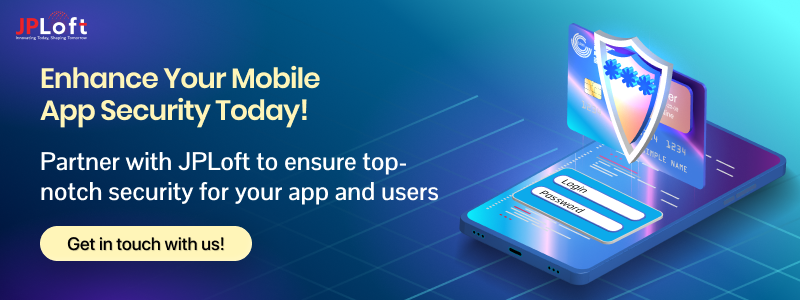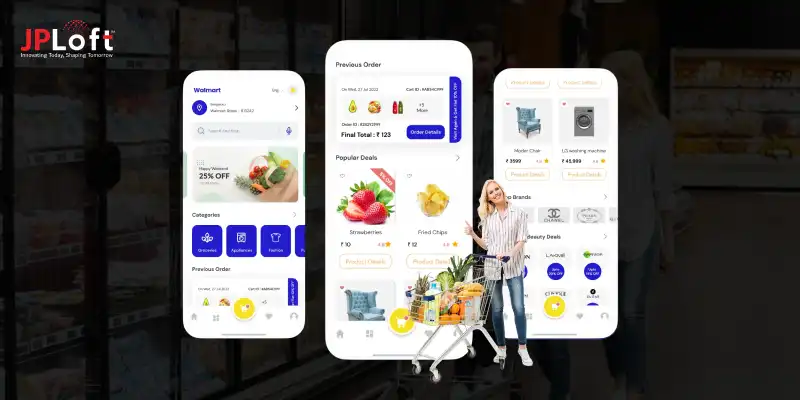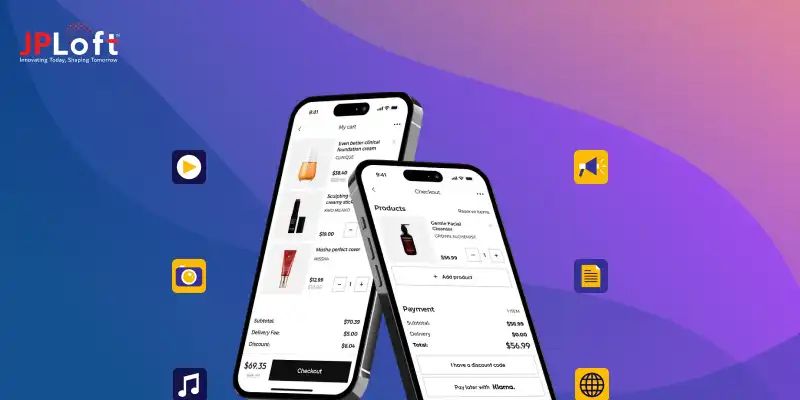Did you know that 43% of cyberattacks target small businesses, with mobile apps being a prime target for hackers?
In the current time, where users rely on apps for everything from shopping to banking, app security is non-negotiable.
Whether you are launching a brand-new app or improving an existing one, making sure of its security is crucial for building trust and partnering sensitive user data.
In this blog, we’ll break down best practices for mobile app security & strategies to keep your app safe, secure, and ready for success.
Let’s dive in!
What is Mobile App Security?
Do you know what is mobile application security?
Mobile App Security is all about safeguarding mobile apps from threats like data breaches, hacking, and unauthorized access.
With more than 3.8 bn smartphone users globally, mobile apps are a prime target for cybercriminals. Studies show that nearly 80% of apps contain serious security vulnerabilities.
Security for mobile apps includes safe coding, strong encryption, multi-factor authentication & regular updates to minimize risks.
By adopting the best practice for mobile application security, developers ensure that sensitive data is protected, enhancing user trust and creating a safer digital environment,
It’s not just about security; It’s about providing peace of mind to every user. When you create a mobile app, securing it becomes a huge responsibility.
If you’re still unsure why mobile app security is such a big deal, let’s get to know about it in the next section:
Why Mobile App Security is Important For Your Business?
From entertainment to food delivery, we have apps for every need. With millions of mobile apps in the market catering to user needs, security is paramount for both investors and users.
A breach of in-app security can lead to loss of customer trust, financial damage, and legal consequences. So, securing your app isn’t just about the user, it’s about your app too.
What other benefits does it provide, let’s find out about it below:
1. Avoiding Financial Loss
The financial implications of a security breach can be fatal.
In 2024, the average cost of each stolen record in data breaches globally was 169 U.S. dollars.
Hackers can steal financial data, commit fraud, or sell sensitive information on the dark web.
Adopting app security best practices can reduce such losses. After all, securing your app is an investment for your safe business future.
2. Protecting User Data
Let’s be honest: User data is invaluable, and a breach could be devastating.
A recent survey found that 42% of apps are vulnerable to security breaches.
This is where laying focus on mobile app development security becomes important.
Prioritize robust encryption, secure storage, and multi-layered authentication to ensure personal and financial data remain safe.
By keeping user information safe, you build trust, and with trust comes repeat usage which is what will drive business growth.
3. Building Customer Trust
With so many apps out there, customer trust is hard to gain and easy to lose.
Studies show that 75% of users would avoid an app if they learned it had a data breach.
Ensuring that your mobile app follows best security practices, such as encryption and regular security audits, proves that you prioritize user safety.
A secure app not only attracts users but keeps them coming back, leading to better retention rates and stronger brand loyalty.
4. Enhancing User Experience
Mobile App Security doesn’t just protect data- it improves user experience.
A study shows that 71% of users are more likely to trust apps with biometric authentication features.
By integrating user-friendly features like Face ID or fingerprint scanning, you enhance convenience without compromising security.
If your app offers a good experience the first time, it encourages users to stay engaged and even further recommend your app to others, increasing your customer base & revenue as well.
5. Staying Compliant with Regulations
Security isn’t limited to protecting data, it’s also about staying compliant with regulations like GDPR, HIPAA, and CCPA.
It is not necessary but a must-to-do thing.
Non-compliance can result in severe fines, with GDPR fines reaching up to €20 million or 4% of the company’s global annual turnover. It can be a huge financial load on your business.
By ensuring your app meets legal standards, you avoid costly fines while building a reputation for being professional.
6. Keeping Ahead of Cyber-Threats
Cyber Threats are growing tremendously, with new vulnerabilities appearing constantly.
A report suggests that cybercrime will cost the world $10.5 trillion by 2025. Huge? That’s right.
To protect your app from changing ever-evolving threats, proactive security measures like regular updates, penetration testing, and real-time monitoring are important.
Given these reasons, it’s understandable that app security is important. However, there are different types of security available and they all have their impact.
Let’s get to know about them:
Exploring the Various Mobile App Security Types and Their Impact
Mobile app security exists in various forms and each has a specific impact on protecting your app as well as the users.
Knowing these types will help you to apply the appropriate measures of security to your app.
Key types include data encryption to protect sensitive information, authentication and authorization to ensure only legitimate users gain access, and secure coding practices to avoid vulnerabilities.
Communication protection is provided in networks, while app scanning identifies changes, and a threat database assists in blocking threats in real-time.
All levels of security are important in ensuring that the app and its users are safeguarded from modern threats and risks.
|
Type of App Security |
Impact |
|
Data Encryption |
Protects sensitive data by scrambling it, preventing unauthorized access. |
|
Authentication and Authorization |
Ensures only authorized users can access the app. |
|
Secure Coding Practices |
Prevents vulnerabilities in the app's source code that hackers can exploit. |
|
Network Security |
Safeguards communication between the app and servers from interception. |
|
App Integrity Checks |
Detects changes to the app code to prevent malware or tampering. |
|
Real-Time Threat Monitoring |
Identifies and blocks potential security breaches instantly. |
Each of these security types plays a vital role in maintaining the integrity of your app, ensuring user trust, and preventing costly breaches.
As this is understandable, it’s equally important to follow several best practices to ensure your app remains secure.
Best Practices to Ensure Robust Mobile App Security
When developing a mobile app, remember, that security should never be an afterthought.
Implementing security measures at every stage becomes important for users' information as well as the app’s reputation.
Let’s dive into the best practice recommendations for building security into new mobile apps that you should follow:
► Use Secure Coding Practices
Start with secure coding techniques.
By adhering to secure coding standards, you can minimize the risk of common vulnerabilities including SQL injection or cross-site scripting.
Secure Code practices and automated security scans can help identify issues early in the development cycle, ensuring that vulnerabilities don’t make it into production.
Focusing on secure code from the start is a top mobile app development security best practice.
► Implement Strong Authentication Mechanisms
Mobile app Security guidelines for use begin with the choice of security authentication procedures.
Implementing measures such as multi-factor authentication (MFA) and strong password policies reduces the risk of unauthorized access.
Other methods include fingerprint or face recognition which are safer and easier when compared to usual passwords.
By using a strong authentication paradigm what this means is that you are making it harder for these intruders to gain access to rightful info and services in your application. For this, we suggest you hire mobile app developers with expertise in secure coding practices.
► Encrypt Sensitive Data
Safeguarding data is one of the essential aspects of mobile app security.
Data must be protected during their transmission and storage by means of such encryption methods like AES.
This guarantees that even in case the attacker compromises your servers or the device, he or she will not be able to understand the information.
This is an essential best practice recommendation of security in mobile apps which safeguards Personal, Financial, and Health information from being shared, thus ensuring customer trust.
► Regularly Update and Patch Your App
Security does not only mean a process that is done once; security is an ongoing strategy.
New holes open over time and therefore your app must undergo routine app maintenance, updates, and patches for it to be closed.
Ensuring timely software updates addresses potential security threats and guarantees the app is up-to-date with the latest security patches.
This best practice for app security is important in protecting your app against new threats, assuring that no one benefits from any kind of vulnerabilities in your app.
► Secure API Integrations
Modern mobile applications are full of various integrations with third-party APIs, thus, the security of such integrations is a must.
Best practices for building secure mobile apps include validating mobile API request checks, guaranteed data encryption, and strict API access provisions.
Secure APIs can ensure that no wrong information is allowed to get into your application and protect both the application and its users from attacks.
Thus, incorporating API security should always be considered a part of mobile app development security best practices.
► Implement Secure Storage Solutions
Another critical type of protection is the ability to securely store sensitive data based on users’ devices in mobile applications.
Some of the recommendations for key storage are the built-in facilities such as Keychain for iOS and Keystore for Android which is device-level encryption.
Besides, spread awareness to users to not use passwords or other pieces of information in clear text, as this will let hackers in.
Adhering to the best practice guidelines for mobile app security regarding the storage of data minimizes the likelihood of a breach even if the device gets hacked.
► Conduct Penetration Testing
Penetration testing is among the recommended measures of mobile app security.
It puts your app through a number of fake tests to see if there are any openings that a hacker can take advantage of.
If performed routinely, penetration testing enables developers to discover areas of vulnerability in the app’s construction, code, or network that cybercriminals could exploit.
This type of approach is a key part of mobile app development security and a perfect way to be prepared for any kind of threat out there.
So, make sure to factor it in while evaluating the cost of developing a mobile app.
How JPLoft Can Enhance Your Mobile App Security?
The growing importance of mobile application security in the current world cannot be overemphasized.
Cyber risks are increasingly evolving, and thus, organizations should invest more in in-app security and personal data. That’s where JPLoft comes in.
Being a top mobile app development company, JPLoft provides highly sophisticated solutions with top app security that would meet the requirements of your project.
Due to our vast experience, your app is developed with the most recent and secure encryption, authentication, and protection features for your benefit and that of your users.
Trust JPLoft to keep your app safe from evolving cyber threats.
Conclusion
Security in the use of mobile applications is one of the most important aspects of the modern world.
In particular, the risks of data leaks, hackers, and cyber threats are continuously growing, so having a securely developed mobile app can prevent users from losing their trust and keep you away from losses and legal requirements.
This is so when you follow the best practices like secure coding, encryption, updates, and other practices your app becomes safe and reliable.
Don’t compromise on security. Implement strong security measures for your app and your users today and ensure the continued success of your app in the future.
FAQs
Mobile application security is a necessary facet of preserving valuable user information, sustaining valuable customer relationships, and avoiding potential economic and image losses. Secure app minimizes the possibilities of piracy and cybercrime, forgery, and intrusion.
These would include secure coding, multi-factor authentication, encryption of data, frequent updates, API security, and penetration testing.
With JPLoft, you can enjoy our premium mobile app solutions with industry-leading security features that include, encryption, authentication, and frequent security updates to guard your mobile application against cyber criminals.
Constant updates are important due to new vulnerabilities in the system. It is advised to release a new updated version of your app at least once every few months, and also as soon as there is an issue with app security.
This involves having a third party professionally arrange mock attacks on your app in a bid to establish areas of weakness that hackers would later take advantage of. It is equally important within app development to build an environment capable of withstanding real-life cyber threats.













Share this blog